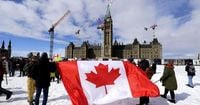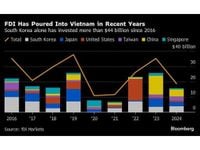The global economy is facing turbulent times as trade wars and political tensions escalate, particularly between the United States and Canada. The European Central Bank (ECB) has recently lowered interest rates for the seventh time since June 2024, acknowledging the mounting risks to economic growth within the bloc. Meanwhile, the Bank of Canada has paused its rate-cutting cycle to evaluate the implications of U.S. tariffs, which could potentially lead to a year-long recession in Canada.
As these economic shifts unfold, the World Trade Organization (WTO) has significantly revised its forecast for global merchandise trade, predicting a decline of 0.2% in 2025. This adjustment is largely attributed to the soaring U.S. tariffs that have disrupted international commerce, marking a stark reversal from earlier optimistic projections.
In the UK, businesses are shedding workers at an alarming rate, the fastest since the onset of the pandemic. This trend coincides with the imposition of a £26 billion ($34.3 billion) rise in payroll taxes and the impact of U.S. tariffs. Investor confidence in Germany has also taken a hit, with the ZEW institute’s expectations index plummeting from 51.6 to minus 14 in April 2025, as the uncertainty surrounding trade measures threatens to stifle a nascent recovery.
On the American front, the economy is bracing for a significant downturn, with estimates suggesting a loss of billions in revenue due to reduced foreign tourism and boycotts of American products. The influx of gold into U.S. futures exchange warehouses, prompted by tariff-driven arbitrage, is now reversing, indicating a shift in market dynamics.
In Asia, tensions continue to rise as China has ordered its airlines to halt deliveries of Boeing jets, retaliating against the tariffs imposed by President Donald Trump, which have reached as high as 145%. Despite these challenges, China’s exports saw a remarkable rebound in March, increasing by 12.4% year-on-year, with notable growth in shipments to Southeast Asia and the United States.
As the trade war intensifies, President Trump is also directing his attention towards Canada, raising concerns among Canadian leaders. Jagmeet Singh, the leader of the New Democratic Party (NDP), has voiced his apprehensions about the potential repercussions of a renewed trade conflict. He warns that Canada’s public health care, clean air, and environmental protections could be at risk as Trump threatens tariffs on pharmaceuticals to bring production back to the U.S.
Singh recalls the previous trade conflict with Trump, noting that Canadian workers bore the brunt of the fallout. He emphasizes the need for Canada to not compromise its health care system or environmental standards to appease U.S. demands, stating, "Health care, clean air and safe communities are part of what holds this country together, and they should never be treated as bargaining chips." Singh advocates for a public Crown corporation to manufacture essential medicines and vaccines, arguing that Canada should not rely on U.S. goodwill for life-saving care.
Moreover, Singh criticizes the stances of Liberal Leader Mark Carney and Conservative Leader Pierre Poilievre regarding trade and environmental issues. He believes that Canada can build a robust economy without sacrificing health care or climate action, asserting that politicians must stand firm against the pressures of corporate lobbyists and trade demands.
Meanwhile, Canada’s automotive industry is grappling with the ramifications of U.S. tariffs, which have prompted calls for a more self-sufficient industry. With over 80% of the 1.5 million vehicles assembled in Canada exported to the U.S., the sector is under pressure to adapt. Experts suggest a five-point plan to bolster the industry, focusing on encouraging Canadians to buy more Canadian-made vehicles, utilizing government purchasing power to support domestic products, and increasing the use of Canadian-made parts in vehicles.
Additionally, there is a push to double down on electric vehicles (EVs) as the industry transitions towards sustainable practices. The Canadian government is encouraged to incentivize the domestic EV market and invest in charging infrastructure to support this shift. The plan also includes empowering the automotive sector to meet other industrial needs, such as defense manufacturing, which could provide new opportunities for growth.
As Canada approaches the federal election on April 28, 2025, the political landscape is fraught with uncertainty. The next government will face the challenge of navigating a disordered world marked by rising costs and a sluggish economy. The long-standing assumptions about continental free trade and the security partnership with the U.S. are being tested, and the ramifications of these changes are yet to be fully realized.
In this climate of anxiety, the need for clarity and decisive action is paramount. Canadians are looking for leaders who will protect their interests and uphold the values that define the nation. As Singh aptly puts it, "Canadians deserve better than silence, slogans or surrender. They deserve clarity — and courage." The stakes are high, and the choices made in the coming months will shape the future of Canada’s economy and its standing on the global stage.








